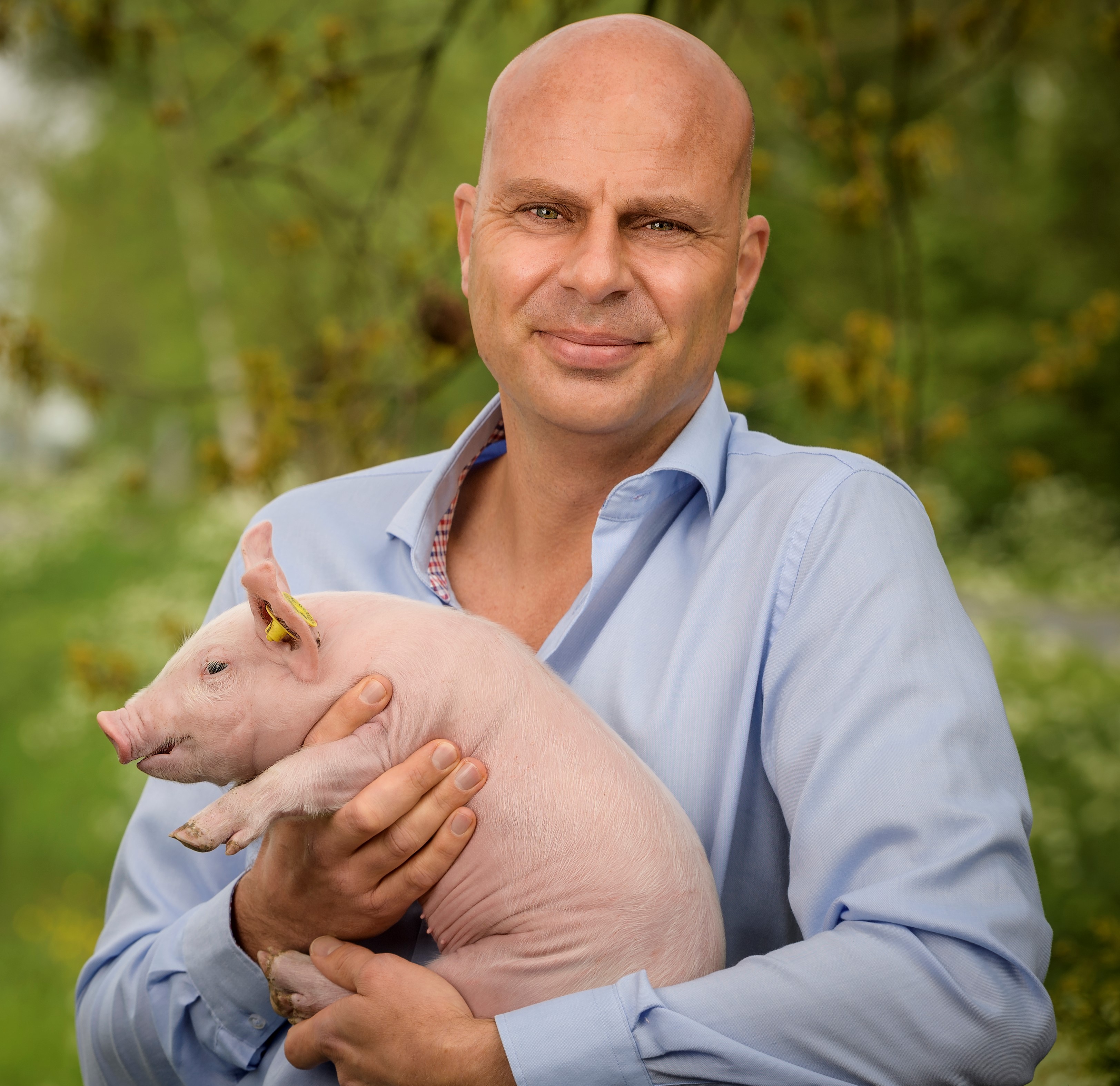EU ban on in-feed pharmaceutical ZnO
CEO Erik Visser sat down with Feedinfo to discuss the EU ban on in-feed pharmaceutical ZnO and how fiber products can remove the need for ZnO in piglet diets.
Interview first appeared in FeedInfo on May 24, 2021.
With a little less than a year to go before the use of zinc oxide (ZnO) as a veterinary medicinal product is banned in the European Union, the pressure on pig farmers across the bloc is increasing to make the switch towards alternatives in weaning piglet diets.
In 2019, young animal nutrition specialist, Hamlet Protein presented fibre as a possible solution to the ZnO challenge, with the launch of its HP FiberStart, a co-processed protein and fibre product that, according to the company, removes the need for the mineral in alleviating diarrhoea during weaning transition and maintains piglet growth performance.
Now, almost two years later, the company is doubling down on fibre for piglets announcing the launch of a new product this summer: HP FiberBoost.
We sat down with Hamlet Protein CEO Erik Visser, to find out why the company decided to add more fibre to its piglet nutrition portfolio and how the new product differs from its current fibre-based solution. Plus, we discovered that this is not the only launch Hamlet Protein has planned for this year.
[Feedinfo] With the EU ban on in-feed pharmaceutical ZnO set to come into effect in June 2022, do you think the industry is ready to meet this deadline? What does the situation on the ground look like currently?
[Erik Visser] Therapeutic use of zinc oxide has been a very effective tool for preventing post weaning diarrhoea in piglets. Without medicinal levels of ZnO, and with the well-known restrictions on the use of antibiotics already in place, European producers are forced to look for alternative strategies to maintain animal performance and health.
Reducing the protein content in the diet is one of those alternative strategies. The challenge, however, is to maintain the current level of high performance, in terms of growth, feed conversion and uniformity, whilst eliminating the zinc oxide without the increased use of other medication.
With the deadline quickly approaching, we notice a growing interest from our customers to evaluate different options. Many producers aim to have their first commercial solutions tested and ready by Q4 this year.
[Feedinfo] One option you are currently offering your customers is HP FiberStart, a protein and fibre product you claim removes the need for ZnO in piglet diets. Please explain what the science is behind fibre as alternative to the therapeutic use of zinc oxide in piglets.
[Erik Visser] We do not think one single product can replace the current use of zinc oxide. A ZnO-free pig production requires improvements in many fields that include farm management, biosecurity, genetics, the health status of the pig and diet composition.
The introduction of fibre as a functional ingredient, to stimulate the gut and ease the transition at weaning, forms part of Hamlet Protein’s strategy to help pig producers to transition to zinc oxide-free diets.
Fibre ingredients have a physico-chemical effect that stimulates the gut function. Soluble and insoluble fibres generate a dual effect, engaging the gut physically and stimulating microflora through the fermentation of selected fibre.
Dietary fibre stimulates the natural production of butyric acid in the lower gut where the desirable effects are needed. Inert fibre physically stimulates the passage of digesta, while fermentation of fibre by commensal bacteria results in the production of butyric acid. Stimulation of the gut microflora to produce more butyric acid depends not only on dietary fibre but also on the sort of fibre used.
[Feedinfo] How has HP FiberStart fared in the market? And what has been its uptake by European farmers since its launch?
[Erik Visser]HP FiberStart is a concept of enzymatically co-processed protein and fibre raw materials. The result is a functional ingredient, which contains fermentable and inert fibres. The purpose is to stimulate the weaning pig in multiple ways.
In addition, the product has the same low levels of anti-nutritional factors (ANF), fast absorbing amino acids and water binding capacity that characterise all Hamlet Protein products.
HP Fiberstart has been introduced in most European markets and the product is currently being evaluated in many commercial trials. Feedback from feed trials and research trials has been positive thus far. We expect to see an increasing demand in commercial use towards the year end.
[Feedinfo] You are currently gearing up for the launch of another fibre product for piglets, called HP FiberBoost. What led to its development?
[Erik Visser]HP FiberBoost was developed to address a market demand from customers interested in combining fibre with a vegetable protein source of their choice.
Where HP FiberStart combines enzymatically co-processed protein and fibre raw materials, HP FiberBoost is a pure fibre product containing functional fibres produced specifically for dietetic use in piglets. It addresses a market demand for pure fibre without the inclusion of protein.
HP FiberBoost allows flexibility apart from the protein for optimising the fibre content in pig starter and/or sow diets. Having this option and flexibility for feed formulations is important to many of our customers.
[Feedinfo] Will European farmers be the first to access this product? Or are you planning a simultaneous rollout across all key markets?
[Erik Visser] The development of fibre ingredients to create a solution for zinc oxide replacement originated in Europe. However, ever since we first introduced HP FiberStart, we are noticing an increasing interest amongst our non-European customers for our portfolio.
We are preparing for the HP FiberBoost product launch across our EMEA (Europe Middle East Africa) and NCA (North Central America) regions in August this year.
In NCA – where we will only be offering HP FiberBoost at this stage - we see a lot of interest from feed companies and pork producers for fibre applications in pig starter and sow feed. We will introduce our product in the US and Mexico simultaneously, and have started the registration process in Canada. Registration is also underway in selected countries in Asia.
[Feedinfo] What should farmers consider when deciding between these two fibre products?
[Erik Visser] Both products use different fibres, where HP FiberBoost also contains pre-biotic carbohydrates.
HP FiberBoost incorporates the latest technology, resulting in the best combination of inert and fermentable fibre components for young piglets. We recommend farmers to use it in combination with our highly digestible proteins.
Not all farmers can introduce a new ingredient into their feeding system and make another silo available. So, in this case HP FiberStart allows for a combination of our proteins together with the fibre components in one product.
[Feedinfo] Based on these two products, Hamlet Protein has clearly investigated the benefits of fibre in piglet diets extensively. Are you now looking into exploring fibre for use in your calf and chick ranges?
[Erik Visser] We are first targeting the swine market but have certainly identified an opportunity in feeding fibre to young broilers and turkeys, as research clearly documents its benefits.
No immediate opportunity for ruminants is being pursued at this stage, although obviously fibre is an important ingredient for calf nutrition as well.
We are continuing our research into fibre applications across species and expect to increase our knowledge on the topic as we expand our volumes with swine producers across the world.
[Feedinfo] Apart from the launch of HP FiberBoost this year, what other developments can the animal nutrition market expect from Hamlet Protein?
[Erik Visser] In addition to HP FiberBoost for piglets, we are also introducing HP AviSure this year; a new product for the poultry industry that, together with HP AviStart, constitutes the new product portfolio for this segment.
HP AviSure is a cost-effective product for starter feeds, that will enable us to extend our penetration in poultry markets that demand competitive protein sources. The development is based on extensive interaction with some of the key players in the poultry industry.
The efficacy of HP AviSure in broiler chicks and poults has been extensively corroborated in several trials in Europe and North America. These trials show improvements in both weight gain and FCR compared with other processed soy products or corn gluten meal and therefore result in a considerable ROI.
Our recommendation is to use HP AviSure for competitive starter feed for apparently healthy birds, while HP AviStart is recommended for top pre-starter and starter feed for birds with or without visible intestinal disorders.
I am excited about the opportunities the launch of our fibre portfolio and the expansion of our poultry portfolio will bring to Hamlet Protein and our customers. And I am very proud of the collective effort of our teams.
Thank you to Morné Brandt, Feedinfo News Service for the interview: https://www.feedinfo.com/


